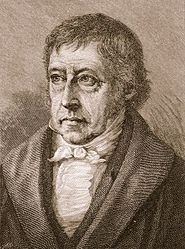 |
| Hegelianism |
|---|
| Forerunners |
| Principal works |
| Schools |
| Related topics |
| Related categories |
Lectures on the History of Philosophy (LHP; German: Vorlesungen über die Geschichte der Philosophie, VGPh,) delivered by Georg Wilhelm Friedrich Hegel 1805-6, 1816-8, 1819, 1820, 1825–6, 1827–8, 1829–30, and 1831, just before he died in November of that year. [1] [2]
Overview
Hegel's lecture notes were edited by his student, Karl Ludwig Michelet in 1833, and revised in 1840-2. An English translation was provided by Elizabeth Haldane in 1892. [1] [3]
In it, he outlined his ideas on the major philosophers. He saw consciousness as progressing from an undifferentiated pantheism of the East to a more individualistic understanding culminating in the freedom of the Germanic era.
In his lectures Hegel cites extensively the voluminous histories of philosophy written in Germany after 1740; among them: Johann Jakob Brucker's Historia critica philosophiae, 6 vols. (1742–67; "Critical History of Philosophy"); Johann Buhle's Lehrbuch der Geschichte der Philosophie, 8 vols. (1796–1804; "Textbook on the History of Philosophy"); Dietrich Tiedemann's Geist der spekulativen Philosophie von Thales bis Berkeley, 6 vols. (1791–97; "The Spirit of Speculative Philosophy from Thales to Berkeley"); and Wilhelm Gottlieb Tennemann's Geschichte der Philosophie, 11 vols. (1789–1819; "History of Philosophy").
See also
- A History of Western Philosophy by Bertrand Russell
- A History of Philosophy by Frederick Copleston
- A New History of Western Philosophy by Anthony Kenny
References
Bibliography
- Hegel, Georg Wilhelm Friedrich (1996) [1892 Kegan Paul]. Haldane, Elizabeth Sanderson (ed.). Vorlesungen über die Geschichte der Philosophie [Hegel's Lectures on the History of Philosophy, 3 vols.]. Humanities Press International. ISBN 978-0-391-03957-5. ( full text at Internet Archive Vol. 1) Vol. 2 Vol. 3
- Walsh, W. H. (1965). "Hegel on the History of Philosophy". History and Theory. 5: 67. doi: 10.2307/2504119. JSTOR 2504119.
External links
- Lectures on the History of Philosophy at archive.org
- Lectures on the History of Philosophy at marxists.org
- Blackwell Reference
- German text
 |
| Hegelianism |
|---|
| Forerunners |
| Principal works |
| Schools |
| Related topics |
| Related categories |
Lectures on the History of Philosophy (LHP; German: Vorlesungen über die Geschichte der Philosophie, VGPh,) delivered by Georg Wilhelm Friedrich Hegel 1805-6, 1816-8, 1819, 1820, 1825–6, 1827–8, 1829–30, and 1831, just before he died in November of that year. [1] [2]
Overview
Hegel's lecture notes were edited by his student, Karl Ludwig Michelet in 1833, and revised in 1840-2. An English translation was provided by Elizabeth Haldane in 1892. [1] [3]
In it, he outlined his ideas on the major philosophers. He saw consciousness as progressing from an undifferentiated pantheism of the East to a more individualistic understanding culminating in the freedom of the Germanic era.
In his lectures Hegel cites extensively the voluminous histories of philosophy written in Germany after 1740; among them: Johann Jakob Brucker's Historia critica philosophiae, 6 vols. (1742–67; "Critical History of Philosophy"); Johann Buhle's Lehrbuch der Geschichte der Philosophie, 8 vols. (1796–1804; "Textbook on the History of Philosophy"); Dietrich Tiedemann's Geist der spekulativen Philosophie von Thales bis Berkeley, 6 vols. (1791–97; "The Spirit of Speculative Philosophy from Thales to Berkeley"); and Wilhelm Gottlieb Tennemann's Geschichte der Philosophie, 11 vols. (1789–1819; "History of Philosophy").
See also
- A History of Western Philosophy by Bertrand Russell
- A History of Philosophy by Frederick Copleston
- A New History of Western Philosophy by Anthony Kenny
References
Bibliography
- Hegel, Georg Wilhelm Friedrich (1996) [1892 Kegan Paul]. Haldane, Elizabeth Sanderson (ed.). Vorlesungen über die Geschichte der Philosophie [Hegel's Lectures on the History of Philosophy, 3 vols.]. Humanities Press International. ISBN 978-0-391-03957-5. ( full text at Internet Archive Vol. 1) Vol. 2 Vol. 3
- Walsh, W. H. (1965). "Hegel on the History of Philosophy". History and Theory. 5: 67. doi: 10.2307/2504119. JSTOR 2504119.
External links
- Lectures on the History of Philosophy at archive.org
- Lectures on the History of Philosophy at marxists.org
- Blackwell Reference
- German text